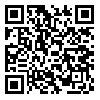Volume 18, Issue 57 (9-2017)
Zanko J Med Sci 2017, 18(57): 11-19 |
Back to browse issues page
Download citation:
BibTeX | RIS | EndNote | Medlars | ProCite | Reference Manager | RefWorks
Send citation to:



BibTeX | RIS | EndNote | Medlars | ProCite | Reference Manager | RefWorks
Send citation to:
Kazemiforouz F, Shirvani S, Khomand P, Marofi A, Araste M, Gharibi F, et al . Prevalence of mood -behavioral disorders (depression, anxiety, obsessive -compulsive Disorder, phobia) in epileptic patients in Sanandaj in2015.. Zanko J Med Sci 2017; 18 (57) :11-19
URL: http://zanko.muk.ac.ir/article-1-177-en.html
URL: http://zanko.muk.ac.ir/article-1-177-en.html
Fateme Kazemiforouz 
 , Saied Shirvani
, Saied Shirvani 
 , Payam Khomand
, Payam Khomand 
 , Azad Marofi
, Azad Marofi 
 , Modaber Araste
, Modaber Araste 
 , Fardin Gharibi
, Fardin Gharibi 
 , Mahsa Abdolmalaki
, Mahsa Abdolmalaki 
 , Marjan Rajabi *
, Marjan Rajabi * 


 , Saied Shirvani
, Saied Shirvani 
 , Payam Khomand
, Payam Khomand 
 , Azad Marofi
, Azad Marofi 
 , Modaber Araste
, Modaber Araste 
 , Fardin Gharibi
, Fardin Gharibi 
 , Mahsa Abdolmalaki
, Mahsa Abdolmalaki 
 , Marjan Rajabi *
, Marjan Rajabi * 

Abstract: (5808 Views)
Backgrounds and Aim: This study aimed to investigate the Prevalence of mood -behavioral disorders (depression, anxiety, obsessive -compulsive Disorder, phobia) in epileptic patients.
Material and Methods: In this study, 42 patients with epilepsy referred to Tohid Hospital who were treated with anti-epileptic drugs were evaluated. Epilepsy diagnosed by a neurologist based on history taking, clinical findings and electroencephalography (EEG) was introduced. Information collected by self-made questionnaire, and the R-90-SCL questionnaire. Data were analyzed by using SPSS software, version 21 and by using descriptive and analytical statistics (chi-square test, T-test). Results probability level P<0.05 was considered significant.
Results: The mean ± SD ages of the participants were 30.26±11.91. Men (36.9%) and women (63.1%) participate in the study. The relative frequency of mood disorders in case group was: depression symptom (54.8%), generalized anxiety disorder (47.6%), panic disorder (40.5%), and obsessive -compulsive disorder (57.1%). Depression symptom, generalized anxiety disorder and panic disorder In comparison with the control group was statistically significant (P<0.05). Finding showed that in case group there is a significant relationship between depression symptom and obsessive-compulsive disorder with employment status and also Panic disorder and generalized anxiety disorder had a significant relationship with duration of epilepsy (P<0.05).
Conclusion: According to the results derived from the study, the prevalence of mood disorders in case group compared to the control group was significant, it is recommended that epileptic patients receive psychological counseling to decrease the symptom of psychological disorders in interictal phases. More attention to this aspect of epilepsy makes significant reduction in the morbidity and mortality of these patients.
Material and Methods: In this study, 42 patients with epilepsy referred to Tohid Hospital who were treated with anti-epileptic drugs were evaluated. Epilepsy diagnosed by a neurologist based on history taking, clinical findings and electroencephalography (EEG) was introduced. Information collected by self-made questionnaire, and the R-90-SCL questionnaire. Data were analyzed by using SPSS software, version 21 and by using descriptive and analytical statistics (chi-square test, T-test). Results probability level P<0.05 was considered significant.
Results: The mean ± SD ages of the participants were 30.26±11.91. Men (36.9%) and women (63.1%) participate in the study. The relative frequency of mood disorders in case group was: depression symptom (54.8%), generalized anxiety disorder (47.6%), panic disorder (40.5%), and obsessive -compulsive disorder (57.1%). Depression symptom, generalized anxiety disorder and panic disorder In comparison with the control group was statistically significant (P<0.05). Finding showed that in case group there is a significant relationship between depression symptom and obsessive-compulsive disorder with employment status and also Panic disorder and generalized anxiety disorder had a significant relationship with duration of epilepsy (P<0.05).
Conclusion: According to the results derived from the study, the prevalence of mood disorders in case group compared to the control group was significant, it is recommended that epileptic patients receive psychological counseling to decrease the symptom of psychological disorders in interictal phases. More attention to this aspect of epilepsy makes significant reduction in the morbidity and mortality of these patients.
Keywords: epilepsy, depression, general anxiety disorder, obsessive-compulsive disorder, panic disorder
Type of Study: Research |
Subject:
Special
Received: 2017/03/2 | Accepted: 2017/06/4 | ePublished: 2017/09/21
Received: 2017/03/2 | Accepted: 2017/06/4 | ePublished: 2017/09/21
Send email to the article author
| Rights and permissions | |
 |
This work is licensed under a Creative Commons Attribution-NonCommercial 4.0 International License. |



